New Delhi: The Supreme Court has emphasized that judges have to follow discipline and ought not to take up any case unless it is specifically assigned by the chief justice and taking up a case not specifically assigned by the chief justice (of the high court) is an act of gross impropriety.
A bench comprising Justices Abhay S Oka and Pankaj Mithal observed that the legal process was abused in the Rajasthan High Court, where after being refused interim relief under Section 482 CrPC for quashing FIR, the accused (three respondents) filed a civil writ petition for clubbing of eight FIRs into one and also got a relief of no coercive action against them in these FIRS.
The apex court noted that petitioner Ambalal Parihar had made a very serious allegation by relying upon the then-prevailing roster notified by the chief justice of the Rajasthan High Court. It was alleged that as the single judge taking up assignment of the criminal matters dealing with Section 482 CrPC did not grant interim relief to the three accused in two cases, this method of filing a civil writ petition was invented in which a prayer was made for consolidation of eight FIRs.
The petitioner claimed that this was done to avoid the roster judge who had not granted interim relief, and the complainants were not impleaded in the civil writ petitions. Also, the same advocate, both in civil and criminal cases, represented the accused.
The apex court said: “This is a classic case of forum hunting by the second to fourth respondents. It transpires that notwithstanding the aforesaid relief granted on 8th May 2023 in the Civil Writ Petition, in the petitions under Section 482 of CrPC for quashing, on 1st June 2023 the second to fourth respondents persuaded the concerned bench to grant relief of not taking coercive action against them”.
The bench said: “Thus, this is a case of gross abuse of process of law. We wonder how a Civil Writ Petition for clubbing First Information Reports could be entertained. In the roster notified by the Chief Justice, there is a separate roster for criminal writ petitions. If the courts allow such sharp practices, the roster notified by the Chief Justice will have no meaning”.
The bench emphasized that the judges have to follow discipline and ought not to take up any case unless it is specifically assigned by the chief justice. “A Judge can take up a case provided either the cases of that category have been assigned to him as per the notified roster or the particular case is specifically assigned by the Chief Justice. Taking up a case not specifically assigned by the Chief Justice is an act of gross impropriety”, said the bench, in its order passed on October 16.
The bench stressed that though a civil writ petition was filed, the judge ought to have converted it into a criminal writ petition which could have been placed only before the roster judge taking up criminal writ petitions.
The apex court was hearing an appeal against a Rajasthan High Court order, which granted the accused protection from any coercive action. The apex court imposed a cost of Rs 50,000 on the accused and dismissed the civil writ petition filed by them. “Therefore, the impugned order does not survive”, said the bench, and also directed the registrar (Judicial) of the Rajasthan High Court to place a copy of its order in all eight petitions under Section 482 of CrPC filed by the respondents for quashing FIRs.
Also read: SC awards Rs 1.25 crore maintenance to a woman, whose husband abandoned her & fled to Australia



